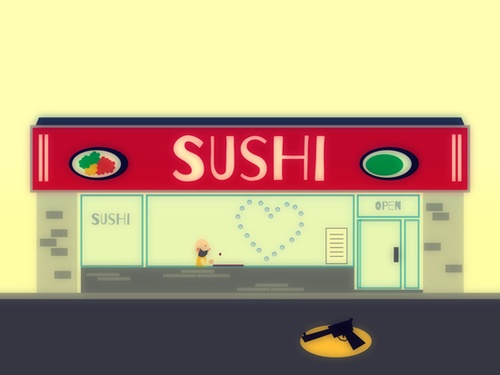 Illustration by Anna Minzhulina.
Illustration by Anna Minzhulina.
Shots in the Afternoon
One of two second-place winners in Maisonneuve's annual Genre Fiction contest. This year's theme was mystery.
A crowd of curious onlookers clustered around the window of a Japanese restaurant, interrupting the pedestrian traffic on Avenue du Parc. A young man, out for a stroll and unencumbered by work and life responsibilities, allowed himself to be drawn into the outer fringe of gawkers.
“What is it?” he asked of no one in particular.
A tiny old Greek woman tugged at his shirt and pointed through the wall of backs in front of her.
“Look there.”
The young man was tall enough to peer between the heads of those in front. Everyone was looking at the window. The window stretched to the ceiling of the restaurant interior and from the entrance to the dining room wall. The bottom half was partially frosted with an impressionistic image of a mountain overlooking a small lake. In the middle of the lake, a young woman in a rowboat was leaning out to gaze at her reflection in the water. It was a still scene.
“Beautiful,” said the young man.
“No, look there.”
In the clear glass representing the lake, there were six small holes whitened and cracked around their edges.
“A man comes,” said the woman. “Crazy on drugs. Bang bang bang! Like that.” She tugged on his shirt again. “I see. Another man is inside. He's eating sushi. Then bang bang bang! Dead.”
“Eating sushi?” asked the young man.
“Yes, then dead.”
The frosted glass of the wooded lake shore filled the bottommost section of window, shielding the victim's body from the crowd's curiosity.
“Must be a new place. Do you know if they deliver?”
The woman shrugged and turned to another new arrival, who was craning his neck to see what everyone was looking at.
“They deliver,” said a middle-aged man in a rumpled suit.
“Any good?
“Not bad for Montreal. The lady?” The man gestured toward the Greek woman. “She didn't see anything. Heard it, maybe. She's got the 'bang bang bang.' Me, I saw it. It was two guys. They did it and took off running in different directions. I heard the guy inside was a big mafioso. It was some kind of hit.”
“How much do you think you'd get for something like that?”
“A hit? Dunno. You'd probably have to hook up with an outfit. Freelance work is a grind. You spend all your time looking for your next client.”
A long-haired Jesus-looking fellow with a guitar strapped to his back turned to face them. “That's not what I saw,” he said. “It was a boy and a girl. They shot through the window and ran off together. They did it for love.” The young man was impressed with the conviction in Jesus' voice, but the man in the suit was inclined to argue.
“Then who was the man eating sushi?” he demanded.
“Maybe a mafioso, as you say,” Jesus said. “Maybe her abusive husband. Maybe both.”
Just then a pair of policemen arrived and shouted at everyone to stand away from the window.
The gawkers spilled into the street, blocking southbound traffic, but, invested with a license similar to that of festivals and street sales, no one seemed inclined to leave. They stood there chatting and arguing over theories while police sirens and squealing tires sounded from side streets. Soon a smiling man in an apron came out of the restaurant carrying a large tray filled with assorted maki, which was very well received, most of the onlookers belonging to the late lunch crowd. Some took the opportunity to pump the chef for inside information.
“No, No. No one is dead,” he said. “It's a practical joke. Very funny!”
“Is that blood?” asked a woman, pointing at some dark spots on his white apron.
“Ha ha ha! Take a menu. Please come again. Ten percent off for counter pickup!”
No one took the chef's version seriously, but he was so pleasant and genial that his interrogators relaxed and contented themselves with debating the rumours circulating through the crowd. The drug-crazed maniac theory, through the Greek woman's determined efforts, proved resilient. The Mafia-hit idea was widely considered the most plausible by virtue of being so common. Jesus, however, won over a surprising number of adherents, so much so that the general feeling was mixed when word came that the police had cornered the shooters in a back alley.
The police cordoned off a pair of side streets, Jeanne-Mance and Esplanade, from Bernard to Van Horne. Those onlookers without jobs to return to took up new positions at the cafes on Bernard. They sipped beer and lattes while patrol cars zipped up and down the two streets and the alley between them, creating an inescapable dragnet for the homicidal drug fiend—or the hired killers or the doomed lovers. This went on for some time, and the young man, sitting with several new friends, gradually lost interest in the spectacle. There was a soccer game on the screen and an afternoon special on tequila shots, so no one noticed when the police cars disappeared.
The young man never heard if any suspects had been captured or indeed if there was truly any victim. He considered watching the evening news or picking up the paper the following day, but he decided against either action, knowing that, while the police would present a version of events that adhered to the available facts, they would disregard its beauty relative to other possible theories. For his part, the young man decided to believe the motive was love. He hoped the boy and girl were still at large. He imagined them still in that same alley, flitting like ghosts from shadow to shadow, living on food left on window sills by kind strangers, keeping their love alive in a hostile world.
Maisonneuve's Genre Fiction Contest runs annually.





